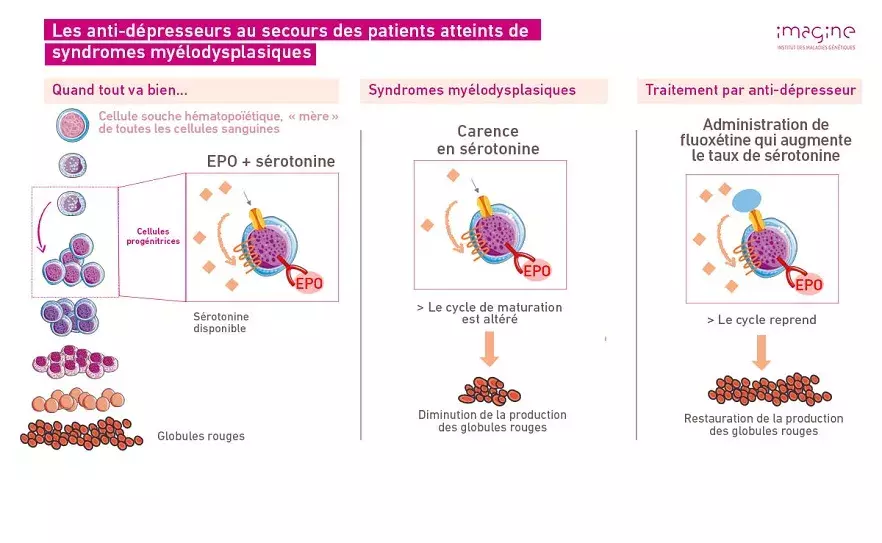Published on 03.12.2019
It all started with an observation: patients with myelodysplastic syndromes have a lower level of serotonin than normal. This deficiency seems to act on the production of mature blood cells, which is also one of the characteristics of these diseases.
Myelodysplastic syndromes are associated with a defect in the red blood cell line
The origin of myelodysplastic syndromes is related to a progenitor cell abnormality in the bone marrow, at the core of the bones. Before becoming red blood cells, white blood cells or platelets, cells go through a series of stages of maturation from these progenitor cells. In this case, it is a defect in the progenitor cells of the red blood cell line which is observed in patients with myelodysplastic syndromes. So, these patients suffer from anemia, which requires regular blood transfusions and sometimes treatment with erythropoietin (EPO). In 2012, more than 4,000 new cases of myelodysplastic syndromes were diagnosed. These diseases are associated with quite a poor prognosis, partly because of the complications of anemia and its treatments, but also because of a risk of acute leukemia for about 30%, with a five-year survival of approximately 40% in France.
Increasing the serotonin level to treat anemia
The team successfully showed that serotonin, a molecule made by the brain and intestine, is also produced within the bone marrow, and that it is essential to the optimal production of red blood cells.
“In animal models, the combined action of EPO and serotonin improves anemia, notes Francine Côté*, CNRS researcher in Olivier Hermine’s* team. In the case of serotonin deficiency, the administration of an antidepressant to increase the serotonin level, such as fluoxetine, seems to be able to restore the proper functioning of the progenitor cell and increase the production of healthy red blood cells.”
Therefore, this research suggests that treating the serotonin level in patients with myelodysplastic syndromes, with an antidepressant treatment for example, could help to improve their anemia. Researchers specify that antidepressants only have an effect when there is a defect in red blood cell production related to a serotonin deficiency, and therefore does not cause overproduction of these cells.
How myelodysplastic syndromes shed a new light on the effect of antidepressants
In addition to this new therapeutic avenue, this effect of antidepressants, unknown up to now, could be applied to other situations of anemia. Therefore, the team is currently looking to find out if other bone marrow diseases are associated with a serotonin deficiency and could also benefit from the use of antidepressants.
Olivier Hermine est professeur à l'Université Paris Descartes, praticien hospitalier et chef du service d’hématologie adulte à l’Hôpital Universitaire Necker-Enfants malades AP-HP, docteur ès sciences, responsable d'un groupe de recherche Inserm à l’Institut Imagine, et coordinateur du Labex Grex.
Enhanced renewal of erythroid progenitors in myelodysplastic anemia by peripheral serotonin
David Sibon, Tereza Coman, Julien Rossignol, Mathilde Lamarque, Olivier Kosmider, Elisa Bayard, Guillemette Fouquet, Rachel Rignault, Selin Topçu, Pierre Bonneau, Florence Bernex, Michael Dussiot, Kathy Deroy, Laetitia Laurent, Jacques Callebert, Jean-Marie Launay, Sophie Georgin-Lavialle, Geneviève Courtois, Luc Maroteaux, Cathy Vaillancourt, Michaela Fontenay, Olivier Hermine & Francine Côté
Cell Reports. 2019 Mar 19;26(12):3246-3256.e4. doi: 10.1016/j.celrep.2019.02.071.

